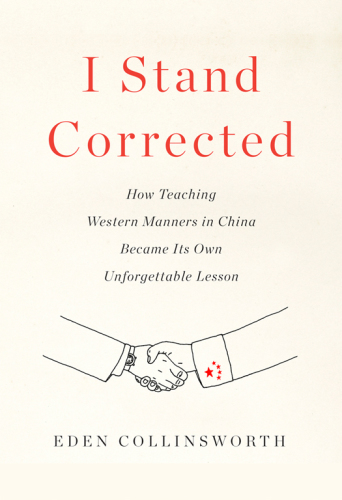
I Stand Corrected
How Teaching Western Manners in China Became Its Own Unforgettable Lesson
کتاب های مرتبط
- اطلاعات
- نقد و بررسی
- دیدگاه کاربران
نقد و بررسی

August 11, 2014
When world traveler Collinsworth decides to spread Western etiquette to China in 2011, she learns more about Chinese customs than she had anticipated. She discovers to her surprise that "everything is slightly illegal in China," from legal documents to business transactions. She joins a friend for a business meeting, whereupon she is promptly offered $20,000 to write a letter to Angelina Jolieâsimply because she was American, it was assumed she knew the famous actress. Collinsworth finds that small talk and compliments are particularly difficult to tackle: an attempt by a host to compliment his guest goes awry when he calls her fat, which is considered a sign of prosperity in China. In between these faux pas, Collinsworth interjects her own lessons that address the nature of problem, so that readers can avoid such mishaps. The juxtaposition of these cultures can be funny or, at times, cringe-worthy but overall this is an entertaining take on life as a foreigner in China.

September 1, 2014
One woman's experiences while living and writing in China. Often, the only way to fully understand a foreign country is to actually live in that country for a time. After years of travel around the world, Collinsworth (It Might Have Been What He Said, 2007) found herself drawn once again to China, a country she had visited on many occasions over a period of years. Fascinated by its culture and people, she moved to Beijing with her son, Gilliam, and set out to understand its nuances. "Like a complicated mathematical equation I was determined to solve, China called me back numerous times..." she writes. "There came many adventures, but only one revelation: I would remain forever and beguilingly mystified by the Middle Kingdom." Based on her observations, she decided the Chinese needed a book on how to interact with Western men and women, so she wrote a guidebook called The Tao of Improving Your Likability: A Personal Guide to Effective Business Etiquette in Today's Global World. In the process of writing the book, Collinsworth discovered many aspects about her own business relationships that required deeper scrutiny, which she explores here. She also incorporates details of her life with her son prior to her move to China. As he grew into adulthood, they traveled around the world, which proved an eclectic and enlightening education for both of them. Collinsworth's observations bring the Chinese and their rituals and history to life, and she adroitly circles each chapter around in order to weave in lessons from her Tao handbook as well. These topics include everything from how to shake hands with a man or woman to proper table manners to how to graciously accept an apology or a compliment. Entertaining, informative adventures of a woman determined to understand the people of China.
COPYRIGHT(2014) Kirkus Reviews, ALL RIGHTS RESERVED.

Starred review from August 1, 2014
Collinsworth's ungainly titled memoir is patiently, delightfully hilarious. In large part, it depicts her experience writing, in China and for the Chinese, a guide to good Western etiquette, The Tao of Improving Your Likability, which became a best-seller in China. Her sources for manners come from her experiences living all over the U.S. but often from her L.A. friends, and she details what really happened and then tells how she sets these ideas forth to the Chinese. Cultural expectations differ everywhere, but for the Chinese, saving face is at a high premium, so she exhibits care in stating, for example, why not to spit at the dinner table. Collinsworth is subtly generous with some details and tantalizingly private with others, but it's all wonderful. She also analyzes what's going on in China now, financially and socially, how it came about, and what might be the consequences. A traveler of the world, often with her multilingual son, Collinsworth also waxes intelligently and humorously about other cultures, for instance, about the differences between Chinese restroom facilities and what she calls the elaborateand some would say overly complicatedrelationship the Japanese seem to have with their toilets. Like Collinsworth's Chinese guide to manners, excerpted throughout, I Stand Corrected is a handbook of sorts, but one to the enormous, never-ending challenges of living not just well or right butperhaps despite it allhappily. A rare, true gift.(Reprinted with permission of Booklist, copyright 2014, American Library Association.)

























دیدگاه کاربران